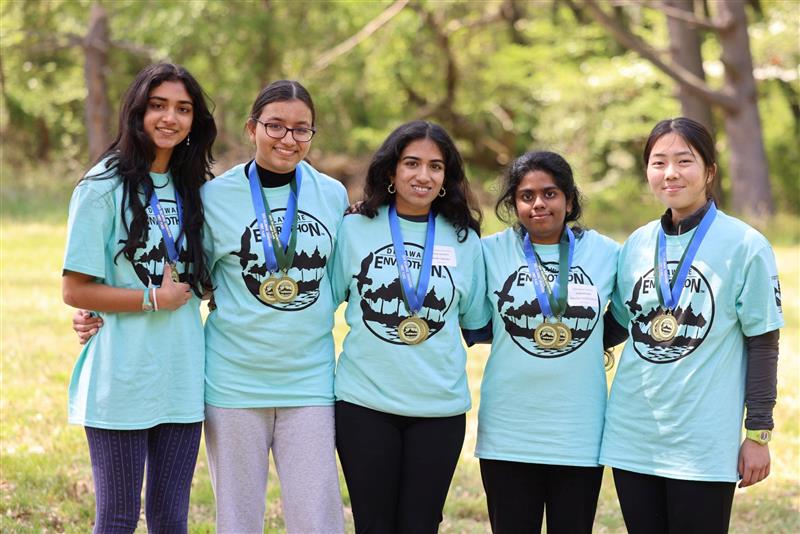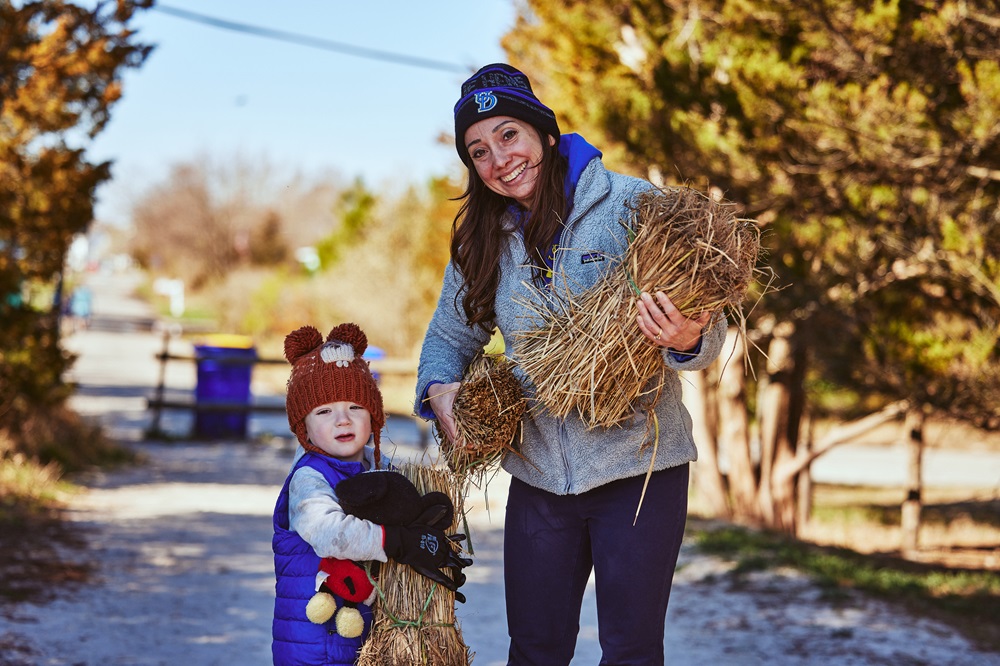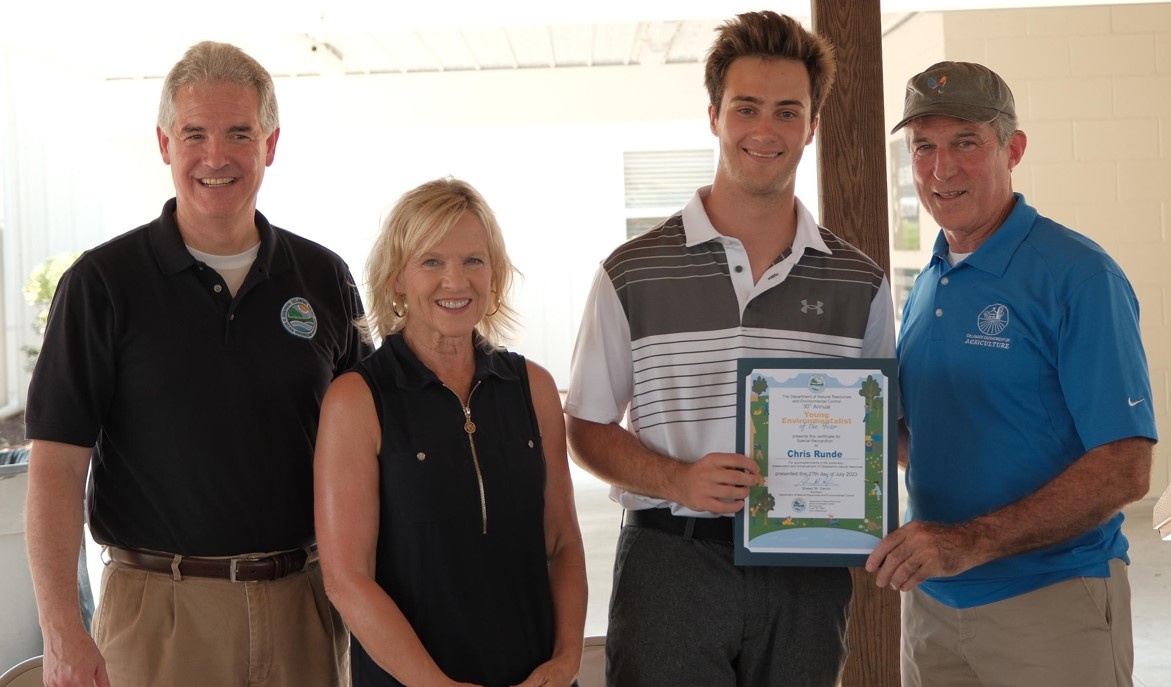Outdoor Delaware is the award-winning online magazine of the Delaware Department of Natural Resources and Environmental Control. Articles and multimedia content are produced by the DNREC Office of Communications.
Everybody is affected by the state of our environment. Actions taken in Wilmington can impact the air and water in Delmar, just as environmental decisions made today can have repercussions for generations to come.
Individual action has a role in the solution. Driving a clean car, encouraging recycling at work, school or home, and educating others about environmental protection can lead to public policy changes. Every resident of the First State can do their part to help care for Mother Earth. And, of course, while one person can only do so much, combined efforts can move mountains.
Young people are often leading the charge in environmental action. They are getting involved in all sorts of activities, like participating in the annual school Envirothon competition and tackling individual projects aimed at benefiting nature. Other students are committed to long-term action, pursuing environmental-based careers.
At several schools throughout the state, thriving Envirothon clubs consist of students who are passionate about the natural world. Members learn about various aspects of the environment, such as soil, wildlife, air quality, aquatic ecology and forestry.
Each spring, roughly a dozen teams from all three counties participate in a daylong competition where they answer written questions and conduct hands-on investigations into a range of environmental issues. The competition tests problem-solving skills and knowledge about nature and some of the issues facing our Earth.
Members of Wilmington Charter School’s 2023-24 Envirothon Club said they joined the group because of an existing interest in the environment and a desire to learn more about nature and ways they can make a difference. Some of them are also involved with the Youth Environmental Summit, an annual gathering of hundreds of Delaware high schoolers that features workshops and presentations on a wide variety of subjects, and several are considering careers that are focused on the environment.

“At the beginning of my high school career I didn’t really know what I wanted to go into, but I started to get into science, technology, engineering and math and then through that I also found a lot of things about sustainability and how our Earth is slowly dying,” said Aishawar Reedy. “Of course, I knew that before, but then I had this urge to fix that. In the future I want to go into something with water treatment. I just wanted to do something that wasn’t just for the money, for something that I actually cared about or an incentive like saving our planet or helping the environment.”
One of the motivators for members to join was to learn more about climate change, particularly ways individuals can make a difference in their own lives.
Indeed, for the youth of today, climate change ranks high on their list of important subjects. A 2021 survey from the Pew Research Center found members of Generation Z — those born from the late 1990s to the early 2010s — are more likely than those from older generations to say climate change should be the top priority for policymakers and to have personally taken steps to deal with it.
This makes a degree of intuitive sense — after all, the young adults, teenagers and children of today are the ones who will have to live with our planet the longest. These future leaders will be grappling with present-day decisions for decades, after most of the rest of us are gone.
To many young people, ensuring the Earth remains habitable is the most important thing governments around the world can do. After all, we only get one home.
Like Swedish climate activist Greta Thunberg, who gained international attention as a teenager for her uncompromising demands that governments make the climate crisis a top priority, a number of young folks cannot understand why more is not being done in this area.
Nustifafa Gyane, the president of Middletown High School’s environmental club, believes her generation is more concerned about climate change than those that have come before.
“The way we talk, the way we’re getting educated right now, especially environmental classes and stuff like that, I feel like we’re getting a bit more educated than the older folks in that generation because now it’s like there’s concrete proof of what we’re doing to the environment. Everything is saying that we’re the cause of this and we’re affecting global warming and sea temperatures rising and glaciers melting and all that, so I think it makes more sense for us this generation because we’ve been hearing this as we’ve grown up,” she said.
Her passion for the environment was partially sparked by attending the Delaware Governor’s School for Excellence last summer, during which attendees had a chance to speak with Gov. John Carney and express their concerns about climate change. It has led her and other members of Middletown’s environmental club to clean up a nearby pond and to successfully push their school to expand its recycling program.

Perhaps no generation has ever been more environmentally conscious than the Zoomers of Generation Z. They are also concerned about social justice and equity, which overlap with the natural world to form the field of environmental justice.
Patrick Ruhl, the manager at the DuPont Nature Center, which sometimes hosts student volunteer groups that help keep the center’s area clean and perform environmental projects, opined that today’s youth are committed to the environment.
“I know many people lump the younger generations together as computer-addicted insiders, but I would beg to differ,” he said. “The various groups of kids and teenagers that we had the pleasure to meet and hold programs for this past year were superb! Many came in with an outstanding knowledge of our local environment and animal species and were eager to get involved and learn more. For the few that didn’t seem too interested in the topic, finding ways to connect to them and spark their intrigue just took a bit of extra work and creativity. I feel much of the younger generation are more in tuned to the environment than most of us may be and are even more aware of the implications of human-induced threats to the world around us than we were growing up.”
The Youth Environmental Summit is the perfect example of that dedication to environmental causes. Now in its fifth year, the summit is largely put together by current high school students, who help book speakers and invite nonprofits and other groups to take part. The 2024 iteration was held in February, with more than 500 students participating.
Organizers said climate change is part of what motivated them to get involved with the summit.
“My interest in YES! stemmed from two things: the mission and the students,” Newark Charter School student and summit student leadership coordinator Runyi Liu said. “YES! is an action-driven organization that works to empower measurable change, which is so valuable in light of the imminent threats of climate change. Additionally, YES! is mainly organized by students — under the mentorship of our amazing adult advisors — and open to high school students throughout the state. It’s a place for our voices to be heard and for our peers to find support for their futures on this planet.”
Of course, Envirothon and the Youth Environmental Summit are just two of the many ways students in Delaware can get involved in supporting our natural world. One of the best things they can do is kickstart their own initiatives to better the state, something some are already doing.
For years, the Delaware Department of Natural Resources and Environmental Control recognized the Young Environmentalists of the Year, students who launched projects designed to benefit the environment.
Chris Runde, a student at Cape Henlopen High School, was one of the 2023 winners. He was honored for collecting more than 300 pounds of old phone batteries and rechargeable devices that were then recycled into anode and cathode components instead of being thrown in the trash, where they slowly degrade.

“I was motivated to act when I realized that once these batteries plague our landfills the harm is already done. The lasting effects lithium has on soil, water — its corrosive and explosive properties — and much more make it extremely dangerous. If it is going to be a common battery used in cars, phones, computers and more, we need to learn a proper method of handling and recycling to prevent future harm,” he said.
Meanwhile, one of the 2022 winners, Conrad Schools of Science student Ty Le Marchand, was honored for raising money to help wolves and for lobbying the White House to re-add the canines to the federal endangered species list. Though young, Ty has a demonstrated passion for our Earth and plans to pursue a career in wildlife conservation.
“I think it is important that young people are actively involved in environmental causes because when I sent a letter to President Biden, he surprisingly responded and told me these exact words, ‘Because of students like you, I am more confident than ever in our country’s ability to overcome any challenge we face.’ This shows that even the adults support us in our path to restore the world to balance in nature, and that us kids must not give up on this dying world,” Ty said.
To Rachel Picconi of Lake Forest High School, nature is full of beauty that should be valued for more than just the tangible benefits it brings to humanity, such as economic opportunities.
“What draws me to the environment is the beauty, complexity and realistic perspective it shows us,” she said. “There is nothing a television screen can show us that could possibly add up to taking a walk outside. Just taking a look at a single leaf you can see the complexity of the veins and how they are shaped. Our environment gives us a realistic perspective when we put our phones down, get outside, and just simply observe the world around us. Then we can realize the true awe in our beautiful environment.”
Picconi is a member of the fishing club at Lake Forest, which teachers Joe Holland and Conrad Steele seek to use a vessel to educate students about the environment and urge them to take steps to protect it. With so many students at Lake Forest coming from rural areas, including a number who have grown up around farming, it’s a natural fit.
Exactly what these environmentally conscious students will go on to accomplish in the coming years is of course a mystery, but it’s clear that Delaware’s natural resources are in good hands. Today’s youth are indeed the environmental stewards of tomorrow, but for many of these young Delawareans, the future is now.
Related Topics: conservation, envirothon, nature, outdoor delaware, young environmentalist, youth, youth environmental summit